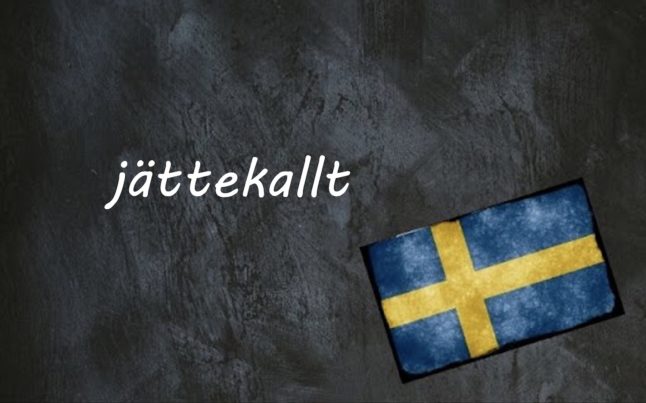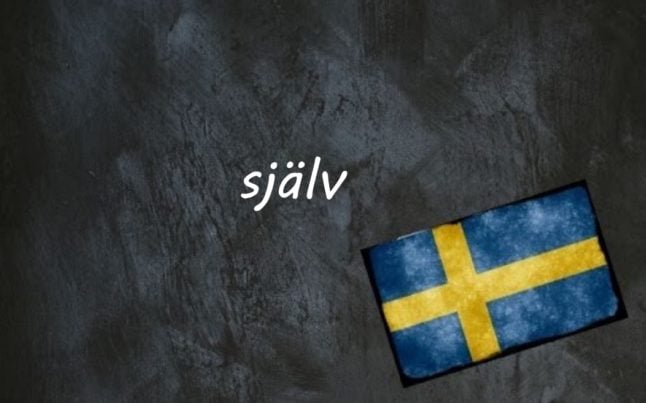Today’s word of the day is inspired by my daughter, who proclaimed on the way to preschool that it was “JÄTTEkallt” outside, roughly translated as “really cold” or “freezing cold”.
We live in Malmö, where the weather is a balmy -4C today (although it was still cold enough for my wet hair to freeze on the way to work this morning).
Further north in Stockholm it is -6C, and in the far north of Sweden in Kiruna, the temperature is as low as -19C.
If my daughter thinks -4C is jättekallt, I wonder how she would describe temperatures of -19C.
The word jättekallt is made up of the prefix jätte-, “giant” and kallt, “cold”. However, this doesn’t mean that the Swedish word jättebra means “giant bra”. Bra is the Swedish word for “good”, so if something is jättebra, it’s “really good”.
The prefix jätte can be seen in a number of other words. A few examples are jättevarmt (“really warm”), jättehögt (“really high”), and jätteroligt (“really fun/funny”). If something is really annoying or difficult, you could describe it as “jättejobbigt”.
- Don’t miss any of our Swedish words and expressions of the day by downloading The Local’s new app (available on Apple and Android) and then selecting the Swedish Word of the Day in your Notification options via the User button
Here, jättekallt is written ending in “t”, because you’ll most likely hear it in a sentence like oj, det är jättekallt idag! (“wow, it’s freezing cold today!”), in which case jättekallt ends in a “t” to agree with det.
Like most other Swedish adjectives, and like the adjective kall itself, jättekall is used with a final “t” when it describes an ett word, and without it when describing an en word. For example: duschen var jättekall (“the shower was freezing cold”), but vattnet var jättekallt (“the water was freezing cold”). The adjective bra is an exception to this rule – both ett and en words are described as bra, not brat.
Although the examples above are all adjectives, the prefix jätte- can also be used for nouns. So if you did, in fact, want to talk about a “giant bra” in Swedish, you could talk about a jättebehå. Giant prawns (often referred to in English as tiger prawns or king prawns) are known as jätteräkor in Sweden.
At the supermarket, you may have come across bread labelled as jättefranska (literally a “giant French”) a giant loaf of white bread made by the brand Pågen. White bread is known as franskbröd or “French bread” in Swedish, which explains this name. If you wanted to describe something as “really French” you could use the adjective jättefranskt.
Jätte can also just refer to a giant. The children’s book written by Roald Dahl titled The BFG – short for The Big Friendly Giant – is translated into Swedish as SVJ, Stora Vänliga Jätten.
In Old Norse, and indeed in Norse mythology, jǫtunn or jötunn is the word for a giant, with the plural form jötnar. The Ents, the tree giants in J.R.R. Tolkien’s Lord of the Rings series, also have a link to the word jätte. The Old English word for giant (eoten, which became ent) has the same root as jötunn and jätte: proto-Germanic *etunaz (an overeater or a giant), from proto-Germanic *etanan (to eat).
This also links to the Swedish word äta, and its English translation: eat.
So, I hope that has given you something to think about – and helped take your mind off how jättekallt the weather is in Sweden today.
Example sentences:
Vill du ta en promenad sen? Usch nej, det är jättekallt i dag!
Do you want to go for a walk later? Ugh, no, it’s freezing cold today!
Snälla ta på dina vantar, dina händer är jättekalla.
Please put your gloves on, your hands are freezing cold.
Need a good Christmas gift idea?
Villa, Volvo, Vovve: The Local’s Word Guide to Swedish Life, written by The Local’s journalists, is available to order. Head to lysforlag.com/vvv to read more about it.
It is also possible to buy a copy from Amazon US, Amazon UK, Bokus or Adlibris.



 Please whitelist us to continue reading.
Please whitelist us to continue reading.
Member comments